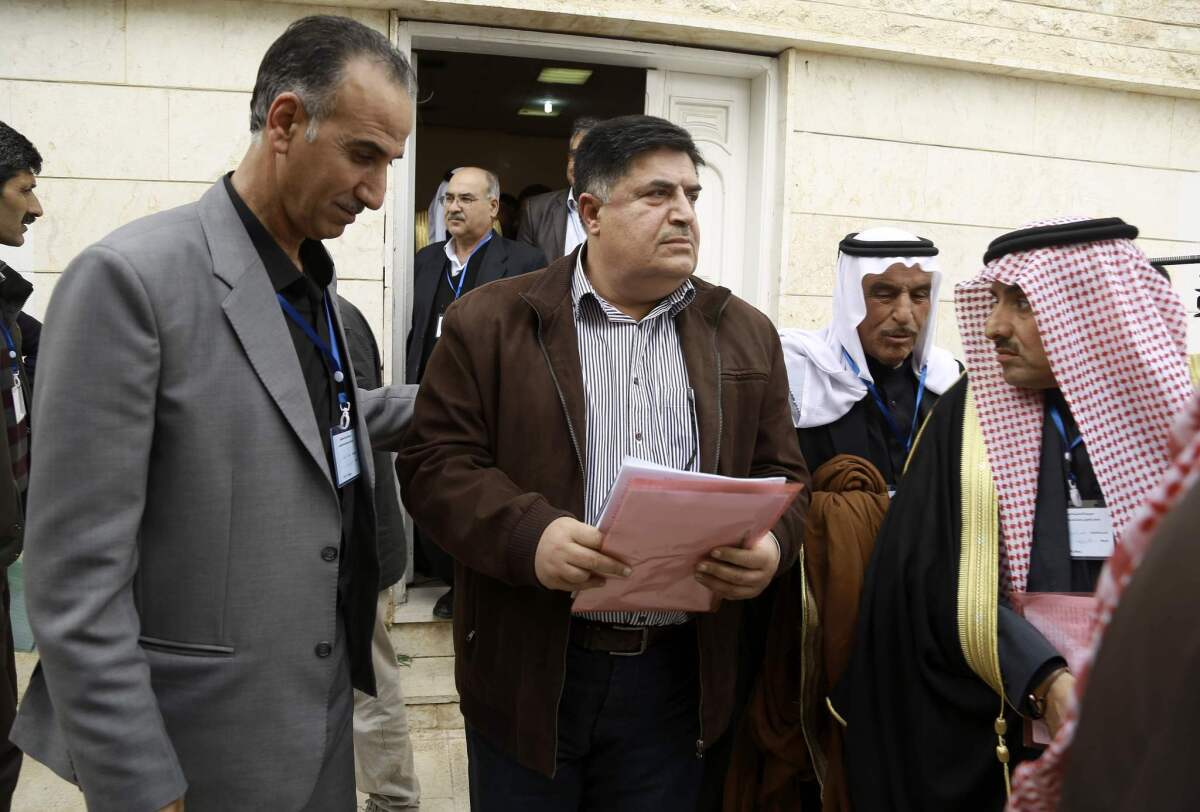Kurdish-led group declares autonomous zone in northern Syria

Amer Halloush, center, of the Syrian Democratic Council, the political branch of a Kurdish-Arab fighting force, leaves after a meeting of more than 150 delegates from Kurdish, Arab, Assyrian and other parties in Syria’s northeastern Hassakeh province.
- Share via
Reporting from Beirut — A powerful Syrian Kurdish group Thursday declared the creation of an autonomous federation in northern Syria, further complicating United Nations-sponsored peace negotiations aimed at forging a political solution for the war-torn nation.
Dubbed “Rojava — northern Syria,” the autonomous, Kurdish-led federation encompasses a more than 250-mile land corridor in northern Syria, south of the Turkish border.
The zone extends from the northeastern tip of Syria, known as the Jazira region or canton in Hassakeh province, to Kobani and Afrin cantons in Aleppo province to the west. Much of the population in the area is ethnic Kurdish, but not all.
The area would be made contiguous by including areas with predominantly Arab and ethnic Turkish populations. Syrian Kurdish militiamen recently wrested those zones from the control of Islamic State, the Al Qaeda breakaway faction that is an arch-enemy of the Kurdish Democratic Union Party, known as the PYD for its initials in Kurdish.
The PYD’s armed wing is among the most effective fighting forces in Syria and has received support from the United States and Russia. The United States has acted as a kind of air force for the Kurdish militia as it has advanced against Islamic State in the Kobani region and elsewhere.
The formal declaration of a federal zone seemed unlikely to have any immediate effect, since much of the region is already under de facto Kurdish control. However, any long-term drive for Kurdish autonomy along the Syrian-Turkish border is anathema to a number of regional players.
Arrayed against the push for Kurdish-led federalism in the north are the governments in Damascus and Ankara — bitter enemies on most every other issue — and the predominantly Arab rebels fighting to oust Syrian President Bashar Assad.
Turkey regards the main Syrian Kurdish militia as a terrorist organization and the Syrian branch of the outlawed Kurdistan Workers Party, or PKK, which has waged a three-decade war against the Turkish state. Hostilities between the PKK and Ankara have recently boiled over anew in southeastern Turkey, where much of the population is of Kurdish descent.
The Kurdish party was kept out of ongoing, U.N-backed Syrian peace talks in Geneva because of Ankara’s objections. Their exclusion from the Geneva talks angered Kurdish representatives.
In Geneva, George Sabra, a negotiator for the High Negotiations Committee opposition bloc, labeled the Kurds’ push toward federalism “illegitimate and unacceptable.”
Kurdish officials emphasized that the federalism effort was not a move aimed at separating Kurdish-dominated territories from Syria. Their plan is to remain part of a new, federalized Syria, the Kurdish officials say.
“We will cooperate with all the institutions and factions that are present in this country because we are brothers and our makeup is one,” Mansour Saloum, a Kurdish political official, said Thursday in an interview broadcast by local media outlet Adar Press.
In Damascus, the Syrian government said that the Kurdish declaration would have “no legal value” nor would it have any “legal or political or social or economic effect,” according to state media.
“We warn any party that aims to undermine the unity of the land and the people of the Syrian Arab Republic under any title,” a Syrian Foreign Ministry official told state media.
The Syrian central government largely withdrew from the Kurdish zones in the north more than three years ago, as Assad’s forces concentrated on protecting the capital and other heavily populated areas. The Kurdish fighters and government forces have generally cooperated and have not been hostile to each other.
The Kurds and Assad government forces — both representing secular authorities — have attacked Islamic State and other hard-core Islamist rebel factions. But the Kurds have also clashed on occasion with western-backed rebel factions fighting to oust Assad.
An opposition umbrella group representing factions backed by the United States, Saudi Arabia and Turkey also rejected the Kurdish federalism push and warned against “any attempt to form regions… that confiscate the will of the Syrian people,” according to a statement by the Syrian National Coalition.
The move toward federalism comes as Kurdish forces have made significant gains in recent weeks. In February, Kurdish militiamen took advantage of the chaos afflicting rebels during a wide-scale government offensive to wrest control of a number of strategic villages close to the northern city of Aleppo.
McDonnell is a Times staff writer. Bulos is a special correspondent.
Twitter: @mcdneville.
More to Read
Sign up for Essential California
The most important California stories and recommendations in your inbox every morning.
You may occasionally receive promotional content from the Los Angeles Times.










